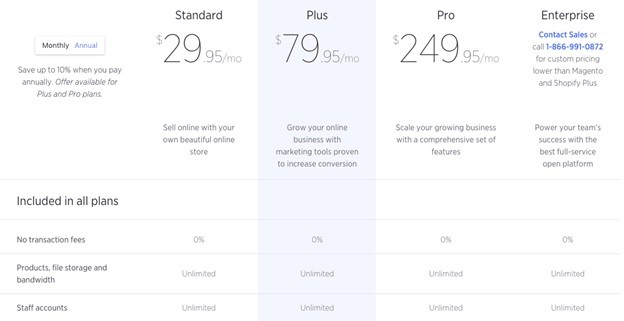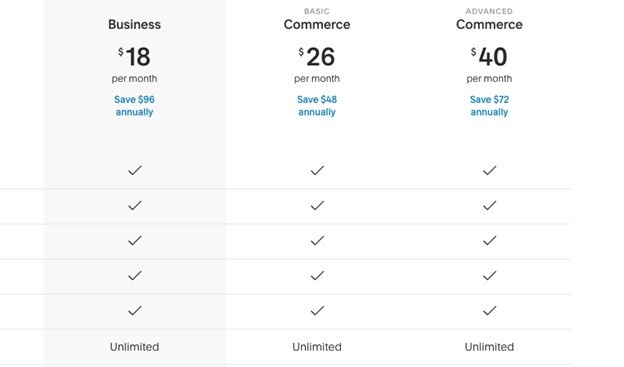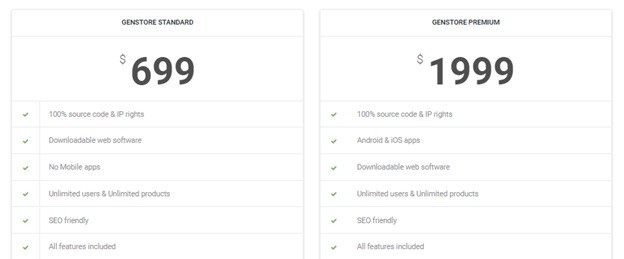5 Best Shopify Alternatives for an Amazing Online Store
Over the past few years, Shopify has come out as one of the best ways to own an online store. The SaaS-based eCommerce platform has allowed so many entrepreneurs to run eCommerce businesses in N numbers of domains. However, this is also a truth that Shopify is not one of the bests when it comes to saving your money or offering complete control over your eCommerce business. Where the monthly recurring payments and commissions make this incredible eCommerce solution inaccessible for some, many other entrepreneurs also wish a little better control over their site with added flexibility.
Flexibilities, such as freedom to choose web-hosting provider, preferred payment gateway solution, source-code access, and customization of the features, etc. That’s where, entrepreneurs feel the need for some good Shopify alternatives that they can use to build their online stores, and have some greater control at the same time. Luckily, there are plenty of alternatives available in the market. We are going to enlist five of the best ones. We chose these solutions for unique reasons:
- Wix- Freedom to customize your store design
- BigCommerce- Closest Shopify alternative with a lesser investment
- WooCommerce – Free open-source alternative with decent scalability
- ShopyGen – Premium, open-source alternative with complete freedom
- Squarespace – Best, economical alternative for small scale web stores
Page Contents
Wix:
Wix is one of the most suitable eCommerce website builders for small-to-medium deployments. If you are a complete beginner and don’t know about the technicalities of building and managing an eCommerce store, Wix is the right choice for you.
Its user-friendly online store builder is enough to create professional eCommerce stores in just a few guided steps. Even a non-techie can build great websites using its ready-made templates and themes. The best part about Wix is its huge catalog of ready-made templates, which makes it highly flexible to customize your store design without touching a single line of code.
Mode of deployment: SaaS and managed services.
Pricing information: The basic eCommerce plan starts from $23/month. The plans go all the way to $500/month for enterprise-level solutions. They don’t charge any additional commission on your sales. Its ‘Business Unlimited’ plan, which costs around $27/month, is the most popular choice among first-time entrepreneurs.

Pros
- Large choice of templates and design elements
- User-friendly website building experience
- Affordable starter plans. No commissions on sales
Cons
- Migration is not possible
- Does not support multi-vendor model
- Enterprise-level plans are expensive for a startup
BigCommerce:
BigCommerce is the closest Shopify alternative with added benefits for medium-to-large businesses. If you are a non-techie, one-man army, and don’t want to manage your website in-house, BigCommerce is the most affordable solution, even cheaper than Shopify in many cases.
It has a decent catalog of over 80 templates of which many are free-to-use. Even the website building interface is very similar and as intuitive as Shopify. The best part is you can customize the front-end up to a limited scale by putting custom CSS and HTML from the dashboard. The biggest reason for choosing BigCommerce over Shopify could be the absence of the transaction fee.
Mode of deployment: SaaS and managed services.
Pricing information: The monthly plans are almost similar to Shopify. It starts at $29.95/month and goes all the way to $249.95/month. There is also an enterprise-level plan, which you can know about after contacting their team to get the quotation.

Pros
- User-friendly online store builder
- Powerful ready-made tools for eCommerce
- No transaction fee on sales you make
Cons
- A limited number of ready-made templates
- Not the cheapest SaaS solution in the market
- Enterprise-level plans could be very expensive
Squarespace:
If you want to build a hybrid of eCommerce store and a blogging platform, Squarespace is one of the most economical Shopify alternatives for you. It’s a general website builder with some powerful tools for eCommerce and virtual shopping cart management.
Many celebrities and influencers use Squarespace to display their portfolio and sell products to their fans at the same time. It’s a highly practical solution for small-scale eCommerce stores to sell both physical and digital products. If eCommerce is not your primary business, and you are just doing to make some extra cash, you should use Squarespace to build your web store-cum-portfolio site.
Mode of deployment: SaaS and managed services.
Pricing information: Starts from $18/month. There is a discount of $96 if you purchase this plan for a year upfront. There are two other plans as well: $26/month and $40/month for Basic eCommerce and advanced eCommerce respectively.

Pros
- Vastly practical and affordable for small-scale and hobby sellers
- Added benefits of integrated blogging and portfolio platforms
- Particularly user-friendly for non-techies and beginners
Cons
- Supports only Stripe and PayPal Payments processing
- It’s not a full-fledged eCommerce platform
- Not suitable for medium and large scale web-stores
WooCommerce:
WooCommerce works on WordPress CMS. A WordPress plugin that adds cutting-edge eCommerce capabilities to the existing platform. It one of the best Shopify alternatives for experienced users who have worked on CMS solutions earlier and want to start a medium-sized web-store.
All you need to know are the basics of CMS solutions, web hosting, and intermediate-level coding skills. If you can manage these tasks by yourself, you can save thousands of dollars annually that you give out to third-party vendors for managing your website. With a massive amount of WooCommerce templates and plugins in the market, it is one of the most customizable Shopify alternatives at your disposal.
Mode of deployment: Self-hosted, open-source code access.
Pricing information: WooCommerce and WordPress are free to use. However, you would have to purchase plugins and a template to personalize your web store.
Pros
- No monthly recurring fee
- Open-source code access and decidedly customizable
- A massive community of WordPress users and developers
Cons
- Not fit for hobby sellers. Requires some time and dedication
- Requires you to purchase a web-hosting plan separately
- You would need third-party assistance for many tasks
Genstore:
If you want to start a multi-vendor eCommerce business with a serious effort to take your business to the skies, look no further than the Genstore. It’s a self-hosted eCommerce script with ready-made solutions to set up a multi-vendor marketplace in a few hours of deployment.
The script is for serious eCommerce entrepreneurs who are willing to go the extra mile to build an eCommerce business from scratch. With ready-made features, the script is fully customizable, as you get the freedom to add new features by tweaking the source code. The script also provides ready-made mobile apps for your website. With some extra payment, you can also ask the script vendors to customize your marketplace platform for you.
Mode of deployment: Self-hosted, open-source code access
Pricing information: There is no recurring fee, just a one-time payment to purchase the source-code for good. The base script cost $ 699 last time we checked. If you also want the mobile app for Android and iOS, the package costs $1999. Custom plans are also available for a custom-made solution.

Pros
- No recurring fee; one-time cost
- Based on MEAN stack; Noje.js shopping cart
- Open-source code access and highly customizable
Cons
- The upfront cost might not be affordable to everyone
- Not fit for casual users. Suitable for a serious goal-oriented venture
- The back-end is user-friendly but requires some initial training to use it
To Conclude
There is no doubt that Shopify is the most popular online store builder in the market. However, not everyone has the same kind of requirement for his or her eCommerce venture. Some might want to start big, while others might just do it for a hobby. Shopify is a serious investment and requires recurring payments. That means you have to make sure you get enough sales to cover-up for the cost you are paying. That’s why, sometimes, you need alternatives that are more accessible to experiment with things. We have explained the pros and cons of every choice we have listed. Analyze them, and find the best alternative for your case.
[su_box title=”Author Bio:” style=”soft”]
I am a professional blogger, guest writer, Influencer & an eCommerce expert. Currently associated with ShopyGen as a content marketing strategist.
I also report on the latest happenings and trends associated with the eCommerce industry.
Follow me on Twitter @Jessicabruc
[/su_box]



